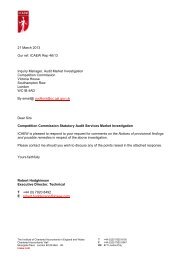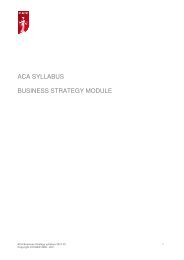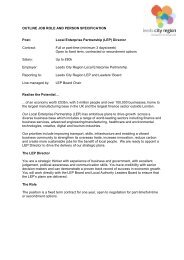RUN A SUCCESSFUL BUSINESS - ICAEW
RUN A SUCCESSFUL BUSINESS - ICAEW
RUN A SUCCESSFUL BUSINESS - ICAEW
Create successful ePaper yourself
Turn your PDF publications into a flip-book with our unique Google optimized e-Paper software.
STEP 1<br />
PREPARING FOR <strong>BUSINESS</strong><br />
Running your own business can be an<br />
immensely rewarding experience.<br />
Every year approximately 400,000 new<br />
businesses start up in the UK.<br />
Decisions taken in the early years<br />
can be the most difficult as well as<br />
the most important, particularly for<br />
first time entrepreneurs and those<br />
with no previous business knowledge<br />
or experience.<br />
This booklet examines the challenges<br />
involved in setting up a business: the<br />
issues that you need to resolve before<br />
starting up and the questions you<br />
need to answer in order to make<br />
those crucial first steps and then grow<br />
your business with confidence.<br />
1. WILL MY <strong>BUSINESS</strong> SUPPORT ME?<br />
The business should provide you with a satisfactory<br />
income in exchange for the time that you put into it, or<br />
it will not be worth doing. There are ways of stacking<br />
the odds in your favour.<br />
Wherever practical, you can reduce risk by beginning on<br />
a part-time basis. For example, if you are thinking of<br />
opening a shop, try hiring a stall in a market first. This<br />
gives you an opportunity to test your idea: how well<br />
does the product sell? Is it priced correctly?<br />
Can it be improved?<br />
Researching your business proposition will help improve<br />
your chance of success. It will also give you a better<br />
understanding of your target market and anticipated<br />
demand. This not only helps shape the decision to go<br />
ahead but can also clarify issues such as where to locate<br />
premises, how much to spend on promotion and<br />
particularly, how much start-up finance will be required.<br />
Before starting work on a full-time basis, you need to be<br />
as certain as you can be that the business will generate<br />
enough profit to provide a living for you and any<br />
dependants. This should usually involve preparing a<br />
business plan, an approach that not only helps clarify<br />
your own thinking but will also form the platform from<br />
which you can convince others (such as the bank) that<br />
your business has a future.<br />
2. WHAT <strong>BUSINESS</strong> FORMAT SHOULD I ADOPT?<br />
There are four main options available to you:<br />
SOLE TRADER<br />
Setting up in business on your own is the most popular<br />
choice. It gives you total control of the business and<br />
the least administrative burdens, but has implications<br />
for tax and raising finance. A big disadvantage of being<br />
a sole trader is that you have unlimited liability and<br />
could therefore risk personal loss if something were to<br />
go seriously wrong.<br />
PARTNERSHIP<br />
If two or more people run a business together as<br />
partners, they share profits, losses and unlimited legal<br />
liability. It is a common and often very successful<br />
formula for business success, but even close relatives or<br />
the best of friends can fall out over money matters.<br />
That is why it is essential to define the rights and<br />
responsibilities of partners and to set them out in<br />
a partnership deed before you start the business so<br />
everyone concerned knows exactly where they stand.<br />
The partnership deed should help establish the amount<br />
of capital to be introduced, the division<br />
of profits, the calculation of individual tax liabilities, and<br />
the adjustments necessary when a partner joins or<br />
leaves the firm. Such issues are complex and need<br />
special accountancy and legal skills.<br />
LIMITED COMPANY<br />
A limited company is a legal entity separate from its<br />
owners. One advantage of this format is its continuity.<br />
Ownership can be changed or extra capital raised<br />
through the selling of shares, without necessarily<br />
affecting the management of the company. And if the<br />
business grows, the company structure can easily<br />
accommodate the expansion.<br />
There are, however, a significant number of government<br />
statutes and regulations covering the operations of<br />
companies and these can add substantially to the time<br />
and money spent on administration. What is more, the<br />
theoretical advantage of limited liability is partly offset<br />
by the common banking practice of requiring personal<br />
<strong>RUN</strong> A <strong>SUCCESSFUL</strong> <strong>BUSINESS</strong><br />
03

















